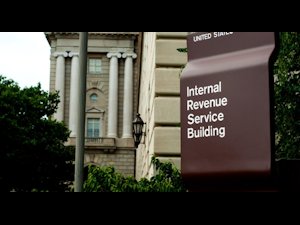The IRS Does Not Need More Money
 | | You just don't understand, they really need a new sign, and it will cost $430,000 dollars (plus labor) |
Last night, the news broke that a data leak on the IRS website allowed hackers to steal the tax information of approximately 100,000 U.S. citizens. This morning, predictably, you can find plenty of people blaming Congress for not giving the IRS enough funding to up their security game. This is hardly a new excuse. When similar fraud involving TurboTax, Intuit, and other software was uncovered earlier in the year, it was the same story. Or just two weeks ago, before the smoke had even cleared from the latest Amtrack crash, liberal commentators were blaming a lack of "adequate" government funding. When the IRS couldn't handle the call traffic during tax season, they didn't point the finger at the bureaucratic mess that is the tax code or the enormous burden placed on them by newly effective provisions of the behemoth that is the Affordable Care Act. No, the head of the IRS himself, John Koskinen, blamed budget cuts.
Anyone familiar with how government works shouldn't be surprised by this. In the private sector, if an organization is having a hard time dealing with budget shortfalls, that organization learns to adapt--to be more efficient, less wasteful, and more innovative--or it gets replaced by another organization all too willing to take its place. (Unless, of course, we are talking about "too big to fail" banks, but that's a can of worms I'm not going to open right now.) However, when a government agency has to cope with a budget shortfall, there is little incentive to find ways to innovate and cut costs, as it is much easier to lobby Congress for additional funds. No other organizations are waiting in the wings to replace a government agency, and the more visible the agency failure, the more they can complain that lack of funding is to blame.
 | | "We are sorry if you found a rat in your food, but instead of shutting down the infected restaurant, we're going to lobby for tax breaks to help combat the problem." |
This is one of the biggest reasons why our national debt is so ludicrously out of control. We've created literally tens of thousands of regulatory agencies, and each and every one is constantly begging for more money. They don't resort to firing very many people or increasing their efficiency when money gets tight. Sure, presidents and legislators are always talking about getting rid of "waste, fraud, and abuse," but instead of actually following through on such promises, they bow to the pressure of an ocean of public-sector lobbyists who all insist that they need more money just to do the job they were tasked with. Sometimes, they don't even know what that job is anymore, but they know they need more funding.
If it were up to me, I'd cut the budget of every agency by 5% every single time they asked for more money.
 | | Don't forget, this is coming from the administration that coined the phrase "economic patriotism" |
It's remarkably similar to dealing with a spoiled child who was never taught the value of a dollar. If a kid grows up with a steady allowance--perhaps one that even increases every few years--and is never tasked with earning that money, he will grow up without a sense of what that money represents. Upon reaching adulthood, he will resent having to work for his money, will always claim that he needs more, and will fail time and again to become prosperous, because he was never given incentive to learn how. For kids like him, they are entitled to your money. They don't think they should even have to ask for it. Government agencies are no different, except that the amount of money they're talking about is quite a bit larger.
Make no mistakes: the IRS isn't coming to you with its hand out. The IRS is demanding more money. They are claiming that every bad thing that happens at the IRS is our fault, not theirs, because Congress just wouldn't give them enough of our money. They don't want to work for it or learn how to reduce their spending habits, because in their mind, they are entitled to a gargantuan budget.
Does the IRS need to improve its cybersecurity? Absolutely. Does it need more money to do this? No. Once the dollar budget of an agency exceeds eleven digits, it's safe to say they have enough money to tackle their own security and simultaneously do their job. Surely they could find ways to maximize their existing, outlandish budget, by streamlining, simplifying, and innovating. Alas, the public sector just doesn't know how to do that, nor do they have a reason to do so. In the greed and laziness of government culture, the people who get hurt are the American people, the ones who are theoretically supposed to be the employers. If the IRS and other agencies aren't answerable to us, they aren't answerable to anyone.
 | | "Hello, ma'am, we're here on behalf of the IRS customer service department" |
Indeed, we fear the IRS. This is exactly backwards; they should fear us. This is an agency that has become the supreme arbiter of how much money the government takes from us and how much it is willing to dole back, using a system so convoluted, so loophole-filled, so crony-rewarding and enemy-punishing, and so incomprehensible that no one--no one--fully understands it. We fill out the ridiculous paperwork year after year and then just pray to the gods of tax enforcement that we get a good return and don't get auditted. Instead of giving the IRS additional taxpayer money, we should be cutting the budget even more, simplifying the tax code so anyone can understand it, and doing away with all the perplexing (and oftentimes contradictory) subsidies and sin taxes of an ADHD-riddled government that can't help but interfere with market forces.
So I blame the budget too. Not because it's too small, but because it's too big. We've rewarded incompetence long enough. Let's try punishing it for a change, just to see what happens.
-e. magill 5/27/2015
|
|